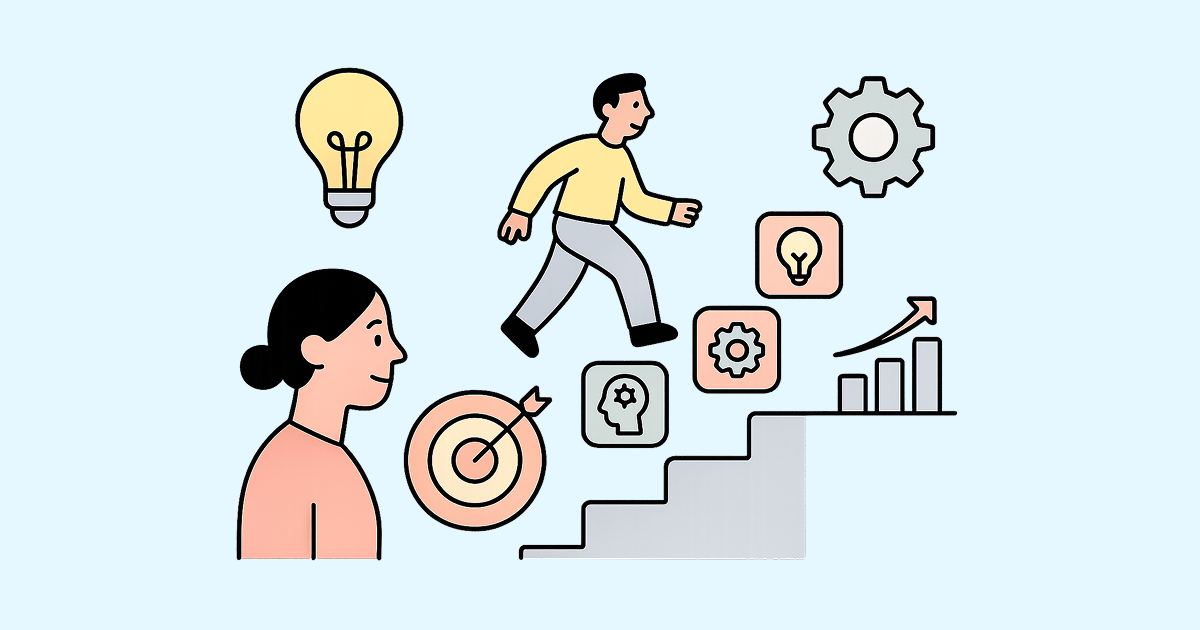Jumpstart 2025: Unlock new skills with our latest lessons

Struggling to fit skill development into your team's packed schedule? We hear you! That's why we're thrilled to unveil our latest release of Lessons— designed to deliver valuable workplace skills in quick, focused sessions that fit into your employees’ busy days. So, let's dive right in and discover what's new!
The GoodHabitz Lesson: A quick recap
Before we reveal our new Lesson topics, let's do a quick refresher on what a GoodHabitz Lesson is all about.
Each Lesson zeroes in on a highly essential workplace topic, grounded in clear learning objectives and delivered through five dynamic activities.
Your team can watch, read, and apply new knowledge, effectively learning a new skill in under 60 minutes.In other words, your team gets meaningful results without sacrificing their valuable time.
And to top it all off, our Team Up feature allows your employees to learn collaboratively, fostering teamwork and shared growth.
5 new Lessons to discover
Now for the moment you've been waiting for!We're excited to introduce our brand-new Lessons:
- Attention to Detail
- Self-Organising Teams
- Creative Thinking
- How to Say No
- Finding Digital Balance
In this article, we'll uncover why each topic is a game-changer and how our Lessons help your team master these valuable skills.
Let's dive right in!
#1 Attention to detail: It’s the small things that make a big impact
Remember that unexpected coffee cup cameo in Game of Thrones?
A multimillion-dollar production, countless eyes on set, and still—a tiny oversight stole the spotlight and had fans buzzing worldwide.
If such a slip-up can happen on one of the most scrutinised shows ever, it's a stark reminder: mistakes can sneak up on anyone.
Why is attention to detail a valuable skill?
Even in our increasingly automated world, human attention to detail is still crucial. While machines handle the heavy lifting, it's up to us to catch the nuances they might miss.
And whether crunching data, proofreading, or even checking for stray coffee cups, if minor mistakes can lead to major consequences, honing your team’s attention to detail is the answer.
In fact, small errors can lead to big costs, with IBM estimating that $3.1 trillion of America’s GDP is lost annually due to incorrect data entry.
That's a hefty price for tiny slip-ups.
Introducing our Lesson ‘Attention to Detail’
We know staying sharp amid back-to-back meetings and overflowing inboxes is tough.
That's why we crafted our ‘Attention to Detail’ Lesson. It's designed to help your team understand the importance of being detail-oriented with practical tips to master the skill.
What your team will gain:
- Assess meticulousness: Evaluate attention to detail.
- Develop attention to detail: Adopt four specific habits to boost attention to detail.
- Improve focus and accuracy: Apply tactics to enhance concentration and execute tasks precisely.
#2 Self-organising teams: Empowerment that drives success
Ever tried steering a massive ship with a tiny rudder? That's what a rigid, top-down team structure can feel like.
Take Nokia, for example—a once global leader in mobile phones that stuck to its guns while the smartphone revolution zoomed past.
Their lack of agility and reluctance to adapt their operating system wasn't just a misstep; it was a fatal flaw that led to their downfall.
Why are self-organising teams essential?
On the flip side, self-organising teams are like agile speedboats—quick, responsive, and able to pivot on a dime.
In a time where market conditions can change overnight, empowering your team to self-organise isn't just a nice-to-have; it's a must to deliver more business value, collaborate more effectively, and work with increased motivation.
Introducing our Lesson ‘Self-organising your team: The essentials’
With that being said, we know turning your crew into a self-organising dream team isn't as simple as just removing hierarchies and saying, "Go forth and be agile!"
It requires a mindset shift, the right tools, and a dash of trust.
That's why we crafted our Self-Organising Your Team: The Essentials Lesson. It provides your team with the foundations to become resilient, innovative, and ready to tackle whatever comes their way.
What your team will gain:
- Understand self-organising teams: Grasp the benefits and how they work.
- Tackle challenges: Learn solutions to common self-organising roadblocks.
- Boost team performance: Apply practices to enhance creativity, engagement, and happiness.
#3 Creative thinking: The key to solving future challenges
Remember when Apple transformed from a garage startup into a tech giant that redefined entire industries? That didn't happen by sticking to the status quo.
As Steve Jobs famously said, "Creativity is just connecting things." It's seeing the same world as everyone else but thinking in ways no one else has.
Why is creative thinking a valuable workplace skill?
Again, if we consider how automation and AI are becoming bigger tools in our team’s arsenal, creative thinking is the ticket to standing out.
It's the magic ingredient that turns challenges into opportunities and ideas into breakthroughs. Therefore, it’s no wonder the World Economic Forum ranks creative thinking among the top three skills employees need.
Introducing our Lesson ‘Creative Thinking’
With this insight, we believe creativity isn't just for the "creatives"—it's for anyone looking to solve problems in fresh, innovative ways. That's why we crafted our Creative Thinking Lesson, designed to help your team approach challenges with a new perspective.
What your team will gain:
- Understand creative thinking: Learn what it is and why it's important.
- Ignite imagination: Break free from conventional thinking with practical methods.
- Apply creativity: Use creative skills to solve problems and make new connections.
#4 How to say no: Setting boundaries to boost productivity
Imagine you have a team member called Alex, a talented developer who became the office go-to for every project.
Need help with a last-minute task? Ask Alex. Tight deadline? Alex will work overtime to get it done.
But after months of saying "yes" to everything, Alex has hit a wall—burnout city.
Why is saying “no” an essential workplace skill?
Alex's story isn't unique.
In our always-on work culture, the pressure to be constantly available and agreeable is real.
But here's the kicker: constantly saying "yes" doesn't just exhaust your team members—it can seriously hinder productivity and creativity.
Your team learning to say "no" isn't about dodging responsibilities—it's about protecting their focus, well-being, and ability to deliver top-notch work.
In fact, employees who set healthy boundaries are more engaged, productive, and satisfied at work.
Introducing our Lesson ‘How to say no’
Saying “no” is easier said than done, especially when you want to be a team player. That's why we crafted our How to Say No Lesson. It's all about empowering your team to set boundaries without burning bridges.
What your team will gain:
- How to say no: Understand why saying no is difficult and how to address it.
- Build assertiveness: Develop strategies to say no confidently and respectfully.
- Set healthy boundaries: Learn to decline requests without guilt to prioritise well-being.
#5 Finding digital balance: Reducing screentime in a hyperconnected world
Screens have become like an extra limb for most of us. From the moment we wake up to the minute we hit the pillow, we're glued to our devices.
The average adult now spends up to 7 hours a day in front of a screen, if not more.
That's almost half of our waking hours!
Why is reducing screentime essential for your employees?
All this screen time isn't just giving us square eyes. In fact, excessive screen use is linked to anxiety, depression, and poor focus, impacting our overall well-being.
With remote work blurring the lines between office and home, finding digital balance is more crucial than ever. Without it, your organisation could face increased risk of burnout, strained relationships, and a decline in job satisfaction.
Introducing our Lesson ‘Finding digital balance’
Ditching devices isn't exactly practical when work, social life, and even grocery shopping revolve around screens. That's why we crafted our Finding Digital Balance Lesson. It's all about helping your team take control of their digital lives without missing a beat.
What your team will gain:
- Assess digital habits: Evaluate current screen time and recognise the need for balance.
- Manage distractions: Learn strategies to resist digital overload effectively.
- Build healthier tech relationships: Apply techniques to develop sustainable digital habits.
Ready to future-proof your workforce with these Lessons?
Investing in these five essential workplace skills isn't just a smart move—it's a game-changer for your organisation.
Our Lessons make mastering these workplace skills straightforward and impactful. With engaging content, practical exercises, and real-world applications—all completed within an hour—your team can start developing these valuable skills immediately.
So, why wait? Share these five Lessons with your organisation and boost your team's effectiveness today.



